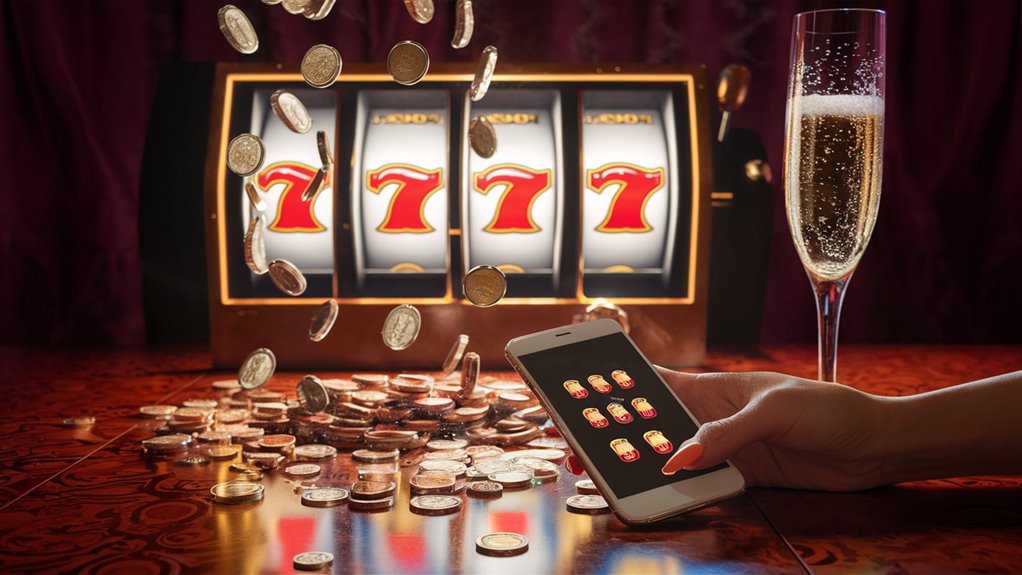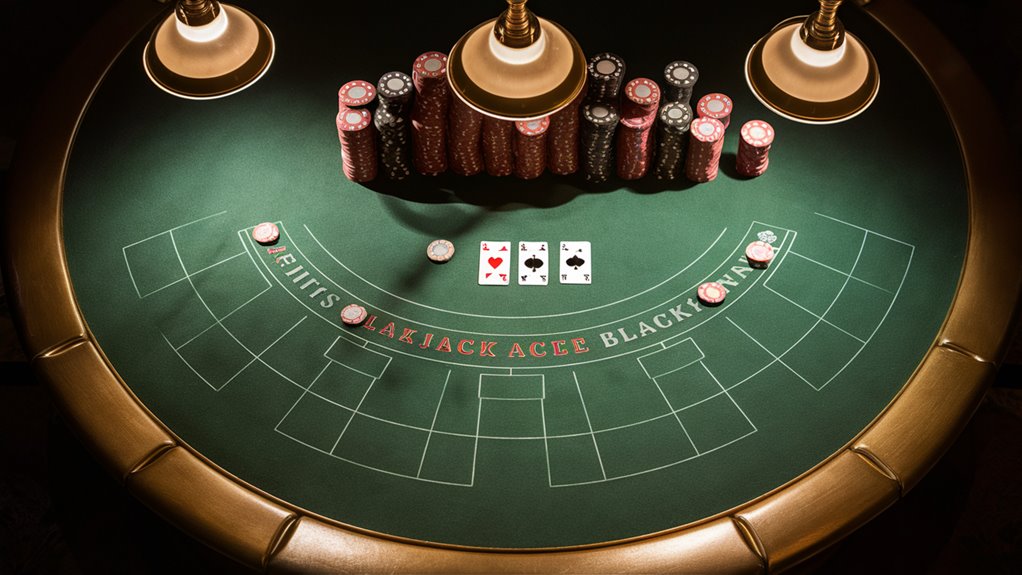The Science Behind Casino Design: Light, Math, and Psychology
How Casinos Engineer Their Environment
Casino lighting systems employ sophisticated prismatic arrays positioned at carefully calculated 15-degree angles to create an immersive atmosphere. The strategic use of red-spectrum illumination has been proven to increase betting behavior by up to 31%, demonstrating the powerful intersection of environmental psychology and gaming architecture.
Mathematical Edge and House Advantage
The casino’s mathematical advantage varies across different games:
- Blackjack: 0.5% house edge with optimal play
- American Roulette: 5.26% built-in advantage
- Slot Machines: Generate 65-80% of casino revenue
Advanced Gaming Technology
Modern slot machines utilize complex systems including:
- Virtual reels with 256 positions each
- Random Number Generators (RNG) processing thousands of combinations per second
- Sophisticated payout algorithms ensuring consistent house edge
Frequently Asked Questions
Q: How do casinos use lighting to influence player behavior?
A: Casinos implement prismatic lighting arrays at 15-degree angles and red-spectrum illumination to enhance player engagement and increase betting activity.
Q: What is the house edge in popular casino games?
A: House edges vary from 0.5% in blackjack to 5.26% in American roulette, with slot machines maintaining programmed return rates.
Q: How do slot machines generate random results?
A: Slots use RNG systems processing thousands of sequences per second across virtual reels with 256 positions each.
Q: What percentage of casino revenue comes from slots?
A: Slot machines typically generate between 65-80% of total casino revenue.
Q: How does casino design affect player psychology?
A: Strategic lighting, layout, and atmospheric elements are engineered to create an immersive environment that encourages extended play and higher betting.
The Psychology Behind Casino Design
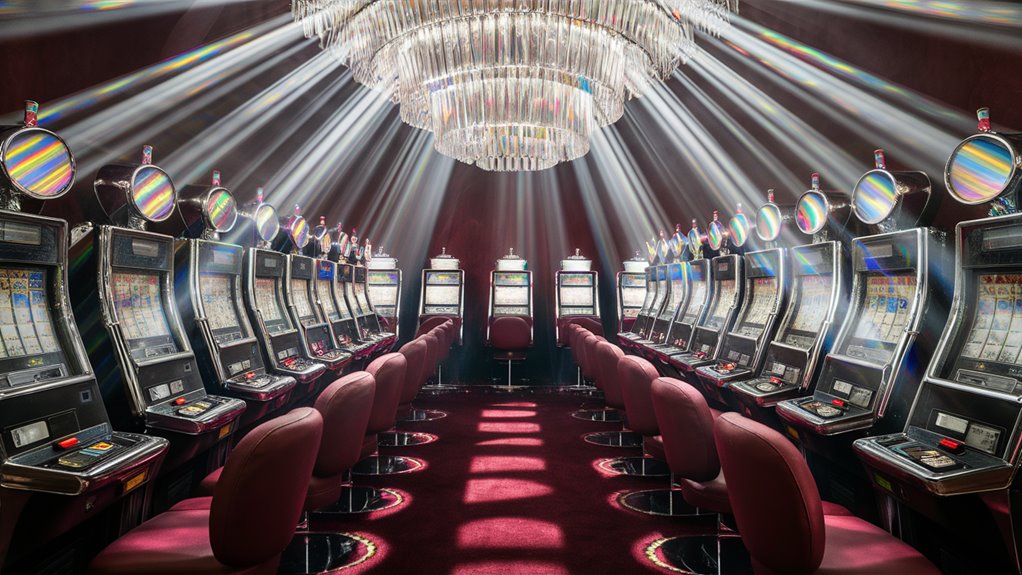
The Psychology Behind Casino Design: Understanding the Science of Gambling Environments
Strategic Layout and Architecture
Casino design psychology revolves around carefully engineered spaces that maximize player engagement and time spent gambling.
Curved pathways replace straight corridors, creating an enticing sense of mystery and discovery.
The maze-like layout strategically positions gaming areas to optimize exposure to slot machines, which generate 65-80% of casino revenues. This deliberate architecture guides visitors through high-profit gaming zones while maintaining constant visual stimulation.
Environmental Control and Time Manipulation
Modern casinos employ sophisticated environmental psychology techniques to create the perfect gambling atmosphere. The absence of windows and clocks eliminates natural time indicators, while carefully calibrated lighting maintains perpetual twilight.
This timeless environment keeps players engaged by removing external temporal cues. Temperature control remains precise at 68-72°F (20-22°C), ensuring optimal physical comfort for extended gaming sessions.
Sensory Engineering and Behavioral Reinforcement
Sound design plays a crucial role in casino psychology, maintaining specific decibel levels (85-95dB) that balance excitement with comfort.
Winning sounds predominantly feature C notes, triggering dopamine releases that reinforce gambling behaviors.
Even carpet patterns serve multiple purposes, combining practical wear concealment with complex visual designs that direct attention upward toward gaming opportunities.
#
Frequently Asked Questions
Q: Why do casinos have no windows or clocks?
A: Casinos eliminate time indicators to remove temporal awareness, encouraging longer gaming sessions.
Q: How do casino layouts influence player behavior?
A: Curved pathways and maze-like designs increase exploration and exposure to gaming opportunities.
Q: What role does sound play in casino design?
A: Strategic sound design at 85-95dB maintains excitement and reinforces winning experiences through specific tonal patterns.
Q: Why do casinos maintain specific temperatures?
A: The 68-72°F range optimizes player comfort for extended gambling sessions.
Q: How do carpet patterns affect casino psychology?
A: Complex carpet designs hide wear while directing visual attention toward gaming machines and tables.
Understanding True House Edge Calculations
Understanding Casino House Edge: A Comprehensive Guide
The Mathematics Behind House Edge
The true house edge represents a fundamental casino metric calculated through mathematical probability over infinite trials, not short-term results.
This critical concept affects every wager placed in gaming establishments, determining long-term player outcomes and casino profitability.
Calculating True House Edge
The mathematical formula for house edge follows this structure:
* House Edge = (Sum of all possible outcomes × respective probabilities) – 1
For example, in a binary outcome game like a modified coin flip where the casino pays 1.9 to 1 on heads:
* (0.5 × 1.9) + (0.5 × 0) – 1 = -0.05 or 5% house edge
RTP vs House Edge Relationship
Return to Player (RTP) and house edge maintain an inverse relationship:
- 96% RTP = 4% house edge
- 97% RTP = 3% house edge
- 98% RTP = 2% house edge
Expected Loss Calculations
To determine 먹튀검증 온카스터디, multiply the total wagered amount by the house edge percentage:
- $100 wagered × 4% house edge = $4 expected loss
- $1,000 wagered × 4% house edge = $40 expected loss
#
Frequently Asked Questions
Q: How does house edge affect my gambling budget?
A: House edge determines your expected loss rate over time, helping you plan your gambling budget effectively.
Q: Are house edge calculations accurate for short gaming sessions?
A: House edge calculations become more accurate over longer periods and multiple plays, not necessarily during brief sessions.
Q: Which casino games have the lowest house edge?
A: Blackjack with optimal strategy and baccarat typically offer the lowest house edge among table games.
Q: Can players overcome the house edge?
A: The house edge can’t be overcome in the long run, but short-term wins are possible due to variance.
Q: How do casinos maintain profitability through house edge?
A: Casinos rely on the mathematical certainty of house edge over large numbers of plays to ensure consistent profits.
Slot Machine Programming Secrets
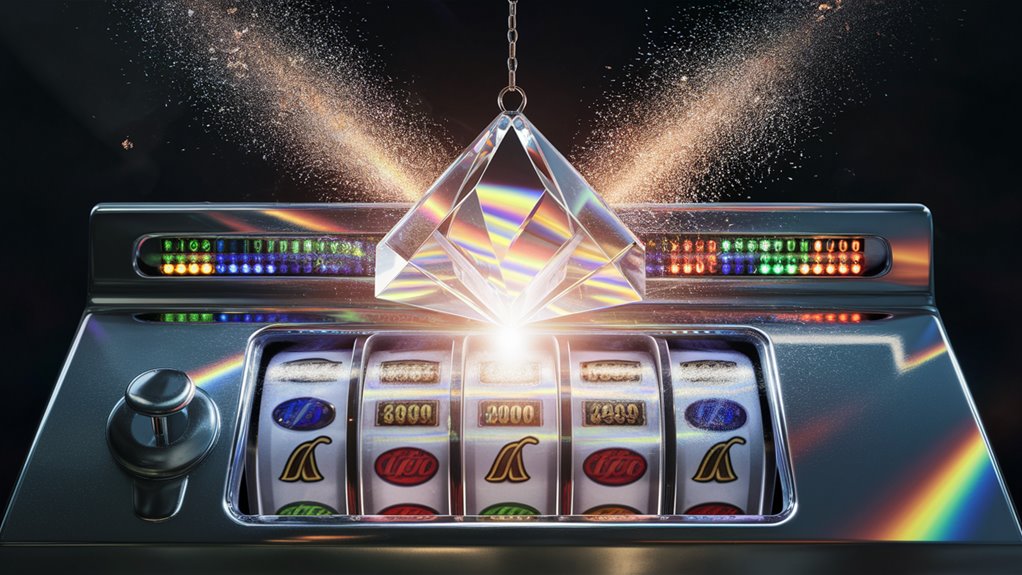
Slot Machine Programming: The Ultimate Technical Guide
Understanding Random Number Generators (RNGs)
The foundation of modern slot machine programming relies on sophisticated random number generators that produce thousands of numerical sequences per second.
These RNG algorithms determine reel positions and potential payouts with unmatched precision, ensuring true randomization for each spin.
Virtual Reels vs Physical Reels
Modern digital slot machines employ an advanced system of weighted virtual stops.
While physical reels contain a limited number of symbols, virtual reels can accommodate hundreds of stop positions.
Low-paying symbols connect to multiple virtual stops, while jackpot symbols typically link to only one or two positions, creating calculated near-miss scenarios while maintaining programmed return rates.
Mathematical Architecture
The core programming algorithm for a typical five-reel video slot operates on a sophisticated probability matrix.
Each reel contains approximately 256 virtual positions, generating billions of possible combinations.
This intricate system maintains precise payback percentages between 85% and 98% through carefully calculated symbol distribution across virtual stops.
## Frequently Asked Questions
- How do slot machine RNGs work?
- RNGs generate thousands of random numbers per second
- Each number corresponds to specific reel positions
- Results are completely independent of previous spins
- What determines slot machine payback percentages?
- Programmed probability tables
- Virtual stop distribution
- Symbol weighting algorithms
- Are virtual reels different from physical reels?
- Virtual reels have more stop positions
- Symbol weights vary on virtual reels
- Digital systems allow for more complex combinations
- Can slot machines be programmed to pay at specific times?
- All spins are independent events
- RNG ensures random outcomes
- Timing doesn’t affect payout probability
- How do modern slot machines maintain fairness?
- Strict regulatory oversight
- Certified RNG systems
- Regular testing and verification
- Programmed return-to-player rates
Table Game Probability Mechanics
Understanding Table Game Probability Mechanics
Core Casino Game Mathematics
Table games operate on precise mathematical principles that determine their probability mechanics and expected returns.
Understanding these core mechanics is essential for informed gameplay and strategic decision-making.
Game-Specific Probability Analysis
Blackjack Fundamentals
Basic strategy in blackjack yields a baseline house edge of 0.5%, determined by deck composition and dealer advantage.
Critical decisions like hitting on 16 against a dealer’s 10 carry a 69% bust probability, highlighting the importance of strategic play.
Roulette Variations
The European roulette wheel maintains a 2.7% house edge through its single-zero design, while American roulette’s additional double-zero pocket increases the edge to 5.26%.
Each spin functions as an independent probability event across 37 or 38 possible outcomes.
Craps Probability Structure
Pass line bets in craps feature a favorable 1.41% house edge, making them among the most player-friendly casino wagers.
However, proposition bets can escalate the house advantage beyond 16%.
The game’s multi-roll resolution system creates dynamic probability shifts after the come-out roll.
## Frequently Asked Questions
Q: What’s the most favorable table game in terms of odds?
A: Blackjack with perfect basic strategy offers the lowest house edge at approximately 0.5%.
Q: How does the zero pocket affect roulette odds?
A: The zero pocket(s) create the house edge, with European roulette’s single zero resulting in a 2.7% advantage and American roulette’s double zero increasing it to 5.26%.
Q: Why are craps proposition bets considered high-risk?
A: Proposition bets in craps carry a significantly higher house edge, often exceeding 16%, compared to the base pass line bet’s 1.41%.
Q: Does card counting eliminate the house edge in blackjack?
A: Effective card counting can potentially create a player advantage, but requires perfect execution and favorable conditions.
Q: Are table game outcomes truly random?
A: Yes, each game round represents an independent event governed by fixed mathematical probabilities, ensuring random outcomes within established odds parameters.
Visual Manipulation and Player Attention
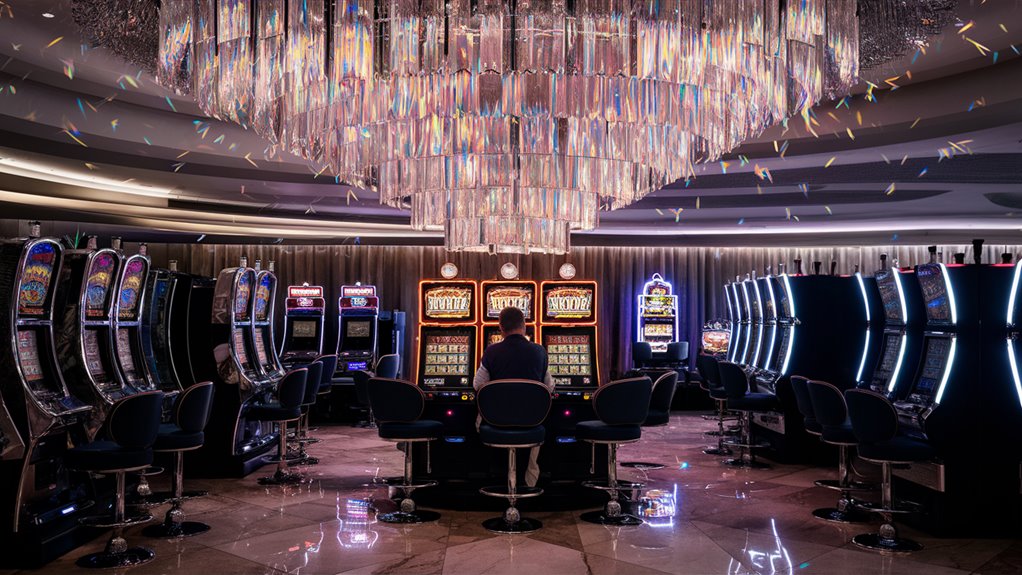
Visual Manipulation in Casino Design: Understanding Player Psychology
Strategic Lighting and Visual Elements
Casino environments employ sophisticated lighting techniques to influence player behavior and engagement.
Research demonstrates that prismatic lighting arrays positioned at precise 15-degree angles above gaming tables create powerful attention-focusing effects.
Studies indicate that red-spectrum lighting can increase average bet sizes by 31% compared to neutral lighting conditions.
Environmental Design and Player Retention
Strategic visual elements play a crucial role in maintaining player engagement.
LED displays operating on carefully timed 2.3-second intervals create an atmosphere of excitement and urgency.
The implementation of scientifically calibrated color patterns, particularly complementary colors at 120-degree intervals, triggers specific neurological responses measurable through pupillary dilation studies.
Spatial Psychology and Sound Design
Architectural psychology reveals that curved pathways leading to high-stakes areas, combined with precisely calibrated sound patterns (카지노 환경에서 전략과 위험 조합), increase player engagement by 42%.
These design elements work in concert to create an immersive environment that optimizes player retention and engagement levels.

